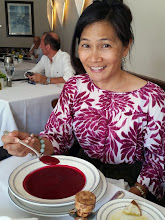
Porto's potato balls: like Ding Dongs made of shepherd's pie, Havana style.
Then I remembered reading a review of La Monarca somewhere, a panaderia that didn't use manteca. Needless to say, I was intrigued. Growing up in Southern California has provided me with a cornucopia of international snacking possibilities, and one of the most treasured tastes of my childhood is pan dulce, the pillowy round sweet breads topped with a sugary and colorful streusel. However, my aging metabolism does not allow me to enjoy these as often, although I search the panaderias ardently for half-size versions of these treats, which have become popular with the war on carbs.

In the bag: the only pan dulce that won't expand my waistline are these cute and fuzzy numbers by Xochico.
I raced to the corner of Wilshire and Euclid in rush hour traffic, in a surprisingly short time. It took me twice as long to get home after that, due to my avoidance of the 10 Freeway and a couple of misguided detours through neighborhoods that I could swear were linked to more familiar terrain. But it didn't matter - my rosca de reyes was snug in its windowed box on the back seat.

Ring of ire: White-knuckling my way through traffic knowing that the roscas might be sold out by the time I got there made my conquest that much sweeter.
La Monarca was, as all the Yelpers say, fabuloso. It wasn't as cavernous as Porto's - which I still love, don't get me wrong - but nicely lit and cozy. The breads and pastries were displayed in the classic panaderia cases, with metal trays and tongs provided for your shopping convenience. And to my relief, there were stacks of roscas in boxes in the middle of the store.
When I got to work, Bernadine gave the large cardboard box I was carrying a quizzical look as if there was a birthday she didn't know about. I sent out an email inviting my coworkers from our two suites to come and have a piece of rosca, with one small change to the tradition. Whoever finds the plastic baby Jesus in their piece is obligated to throw a party on February 2, which is Candlemas, the day that the infant Jesus was presented at the temple. (I told you that Catholics get a lot of holidays!) I decided that whoever got the doll would be entitled to extra good luck for the new year. Intangible, but it's all about attitude.
Bernadine popped into the conference room while I was arranging the rosca with napkins and a knife. I began to tell her about the Epiphany, which is celebrated with more gusto in Latin Catholic countries than anywhere else. My mother, who grew up in the Philippines near Manila, was the one who told us about the feast day, but I think it was just an excuse for sending her Christmas cards late and leaving the tree up for weeks after the holidays. I stole a small slice, hoping that I wouldn't ruin the suspense of finding the doll. I didn't, but wished I had a cup of coffee at that moment to go with the subtle sweetness of the rosca.
Drulet, Amy, Annette, and Adriana arrived and immediately got into devising a strategy to find the doll. After a lot of demurring about who would take the next piece, Drulet dove in and began to poke and prod the cake until settling on an auspicious spot. She took a good-sized piece and ate it, carefully ripping the soft cake into small pieces in search for a tiny limb. The rest followed suit until the rosca lay in a number of chunks on the cardboard.

The first cut was the deepest: Dru dives in.
Of all the Yuletide characters that fill the imagination, the Magi are the most mysterious, yet the least explored. The word is the Latin plural of magus, which refers to those who could read and manipulate the stars and practice magic. And of course, my favorite Christmas story of all time, O. Henry's "The Gift of the Magi" is a heartwrenching and funny look at the way that the holidays transform our aspirations and our realities.
The rosca turned out to be a great conversation starter, as often what is shrouded in mystery is more interesting to talk about than what is apparent. Amy realized that was probably why the city of Long Beach waited two weeks after Christmas to pick up residents' discarded Christmas trees. And Adriana, a native of Mexico City, said that although her family was not Catholic, if you live in Mexico, you have to have a rosca. As in the
As we joked and laughed about where the doll could possibly be, I happened to glance down at the rosca and saw a small white figure at the end of a cut slice. They all said that I was "the winner" and we discussed possible alternatives for a prize other than throwing a party. One of the more brilliant ideas was to get an extra day off, but I think we would have to take that up with the state, which would probably not appreciate the combination of quasi-religious practice with baked goods.

Oh baby, baby: the wily doll eluded the knife and mooned us from his sugary perch.
El Dia de los Reyes Magos (Three Kings Day) is like a whole second Christmas, with more gifts, more parties, and more food. But the real epiphany is that it only takes a few moments out of a busy day to share something more sustaining than food - laughter, good conversation, and a sense of fun. Here's to a year of more adventures with friends and food.






No comments:
Post a Comment